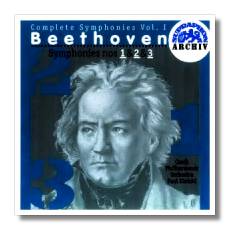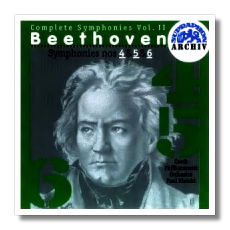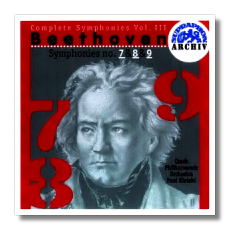
The Internet's Premier Classical Music Source
Related Links
- Beethoven Reviews
- Latest Reviews
- More Reviews
-
By Composer
-
Collections
DVD & Blu-ray
Books
Concert Reviews
Articles/Interviews
Software
Audio
Search Amazon
Recommended Links
Site News
 CD Review
CD Review
Ludwig van Beethoven

Symphonies
- Symphony #1 in C Major, Op. 21 (1800)
- Symphony #2 in D Major, Op. 36 (1802)
- Symphony #3 "Eroica" in E Flat Major, Op. 55 (1803)
- Overture "Egmont", Op. 84 (1810)
Czech Philharmonic Orchestra/Paul Kletzki
Supraphon SU3451-2 ADD 2CDs 59:53, 56:55


- Symphony #4 in B Flat Major, Op. 60 (1806)
- Symphony #5 in C minor, Op. 67 (1807)
- Symphony #6 "Pastoral" in F Major, Op. 68 (1808)
- Overture "Coriolan" in C minor, Op. 62 (1807)
Czech Philharmonic Orchestra/Paul Kletzki
Supraphon SU3453-2 ADD 2CDs 66:01, 52:27


- Symphony #7 in A Major, Op. 92 (1812)
- Symphony #8 in F Major, Op. 93 (1812)
- Symphony #9 "Choral" in D minor, Op. 125 (1824)
Ingeborg Wenglor, soprano
Annelies Burmeister, contralto
Martin Ritzmann, tenor
Rolf Kühne, bass
Czech Philharmonic Orchestra & Chorus/Paul Kletzki
Supraphon SU3455-2 ADD 2CDs 62:59, 68:02
Paul Kletzki was born in Poland 100 years ago, and he enjoyed a conducting career that took him practically all around the world. He succeeded Ernest Ansermet as principal conductor of the Orchestre de la Suisse Romande, and earlier, he conducted the Dallas Symphony Orchestra for three seasons. His first appearance with the Czech Philharmonic as a guest conductor was in 1947. He returned to Prague many times, and these recordings were made between 1964 and 1968. His many excellent contemporaries have overshadowed Kletzki, yet he could certainly rise to the occasion, as these reissues show.
There's not a weak recording here. Although he seems to fall on the slower side of the continuum, Kletzki's tempo choices are fairly conservative. In the First, Second, and Fourth Symphonies, he stays within the Classical tradition, personalizing the music but never exaggerating it. The second movement of the First Symphony, for example, is made to sound bigger than it usually does, and the effect, while humorously pompous, is never caricatured. "Serious fun" describes the music-making throughout these six discs. It is strong, masculine, and balanced. Even in the slow movements, Kletzki is not precisely tender. Instead, he holds a aristocratic mask up – but not completely, so a warm (yet objective) human eye always is looking out at the listener. The slow movement of the Seventh Symphony is less of a tread and more of an elegy, given the emphasis on legato playing, and the de-emphasis on the spaces between the notes. It is an unusual but effective interpretive choice.
Kletzki's conducting has several areas of technical strength. He is wonderful at bringing out Beethoven's inner lines and clarifying the vertical structure of the music without sounding fussy. Along with this strength, he voices chords very well. Try, for example, the start of the "Eroica" and hear the work that has gone into just this one aggressive gesture played twice. The same is true for the opening of the First Symphony, which is similarly thoughtful. Kletzki achieves contrast among the musical materials not by imposing changes in tempo or in dynamics but changes in texture itself. One curious tendency that I noticed, however, was for Kletzki to be inconsistent with repeated material. For example, in the third movement of the Second Symphony, Kletzki's tempo after the trio is noticeably faster than it was before. Also, he seems not to have been a disciplinarian. The Second Symphony's finale apparently catches the Czech Philharmonic by surprise, but of course they recover quickly. These are the little idiosyncrasies that a vigilant recording producer would have fixed.
The orchestra plays this music beautifully; the tradition is in their blood, just as it is for the Vienna Philharmonic. (The two ensembles are, after all, not separated by very many miles.) The Czech strings are not as rich as Vienna's or Berlin's, but there are only a few occasions when this seems like a real debit. The wind solos sometimes are played a little prosaically, but that differs from symphony to symphony. In the "Choral" Symphony, the bass is an imposing soloist, and the chorus sings with inspiration. The soprano and tenor, however, are nothing to get excited about. Kletzki seems to revel in the Czech Philharmonic's sound overall, and well he should. The orchestra was recorded in the Dvořák Hall of Prague's Rudolfinum, and this location's acoustics place a rich, burnished aura around the Philharmonic. Yes, these recordings are more than three decades old, but the engineering was good to begin with, and it is a treat to hear the interaction between a classic ensemble and a classic playing-space.
These discs are new entries in Supraphon's "Archiv" series. Cynical readers might nudge each other and whisper, "How convenient for Supraphon that they could join the crowd with some old Beethoven symphony recordings of their own." When low-priced cycles by Szell, Walter, Bernstein, Karajan, Böhm, and others are available, one can hardly blame them for being cynical. Nevertheless, Kletzki's Beethoven belongs in this exalted company. Collectors would be entirely justified in adding these discs to those already in their libraries, for the reasons mentioned above. Newcomers without a Beethoven symphony to their name could do worse than to begin with Kletzki's dignified yet exciting readings.
Copyright © 2000, Raymond Tuttle




















